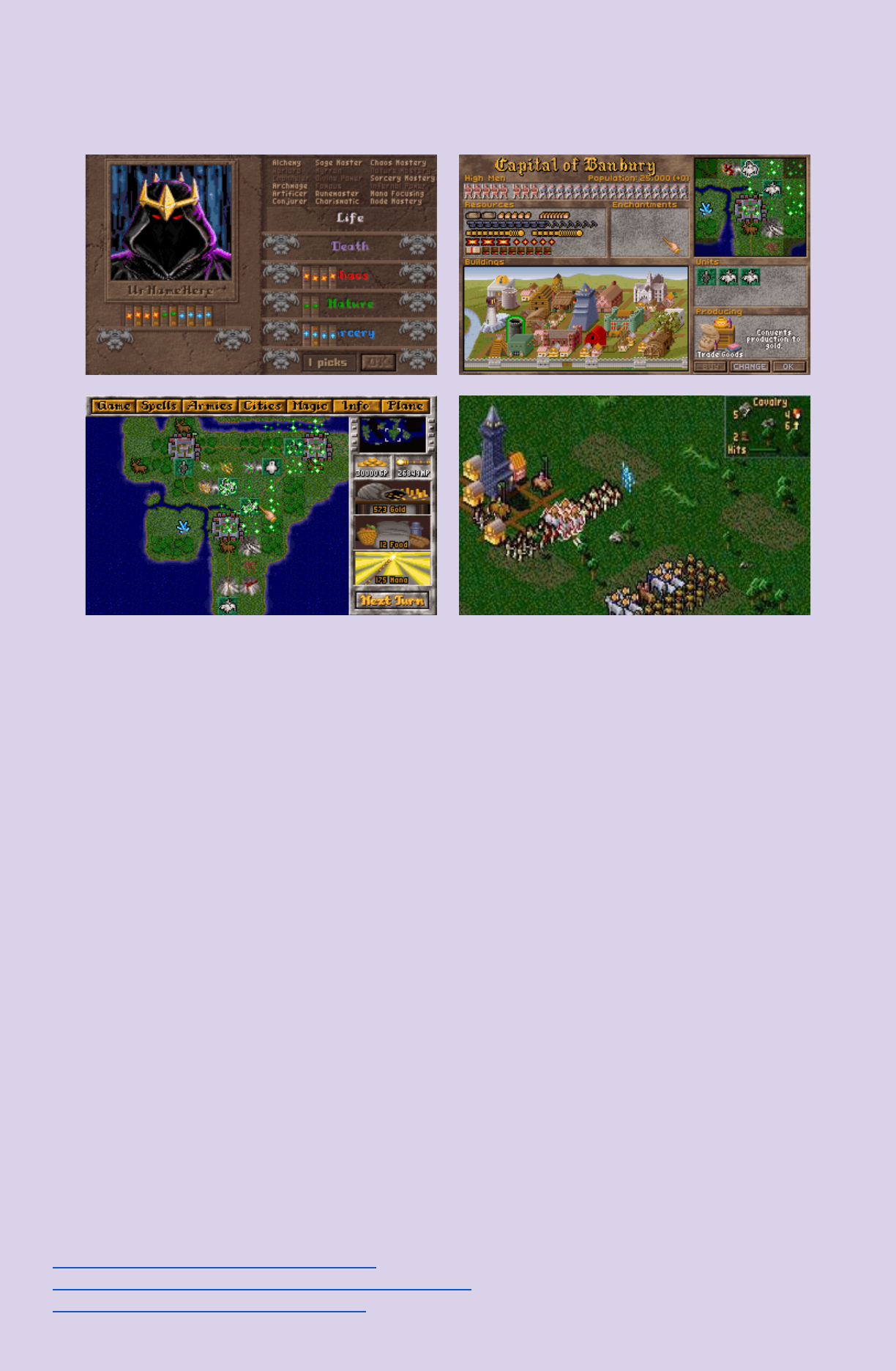
Master of Magic
Jumpchain by Acheld. Version 1.15. Based on the 1994 Video Game.
Welcome, [yourname], to the world of Master of Magic! This will work a bit differently than most other
jumps, in that you may be here far more than ten years, perhaps centuries! There’s an ability you’ll
find below that will help “fast forward” if you begin to feel the weight of the years too heavily, however.
You are an unaging wizard while here, and your life may only end through violence or direct magic.
You are one of the few with the power to master the underlying rhythms of the twin worlds, Arcanus
and Myrran. You start with a few simple spells, an aptitude to learn many more, and a single town
(with control over the immediate area) of one of the many races in the world. They will be your core
people in your march to victory. Your people have only explored the region around the town; who
knows what beasts, ruins, enemies and ancient magics lie in the shadows beyond your realm?!
You will gain magical power through capturing “nodes” of energy in both worlds, and travel between
the two worlds with either gateways scattered throughout the land, or through direct magic. Heroes
can be hired by you to fight alongside the armies of your people, and you can craft items to aid them.
Different buildings in the cities of your people may generate mana, increase production, please the
populace, allow new types of soldiers for your armies, or have other effects entirely! The power you
gain from the magical nodes (of chaos, nature and sorcery), from your mystical buildings (either of
light or darkness), and (for some races) the people themselves, will allow you to master new spells
and maintain greater enchantments.
The jump ends when either you, or one of the other wizards that you will compete against has
ascended to supremacy over the worlds, either through conquest, pure magical might (by casting the
ultimate Spell of Mastery), or through submission of the other wizards to your authority.
Now, take these 1000 CP, and continue...
More info on the setting:
https://en.wikipedia.org/wiki/Master_of_Magic
http://masterofmagic.wikia.com/wiki/Master_of_Magic_Wiki
http://www.gog.com/game/master_of_magic
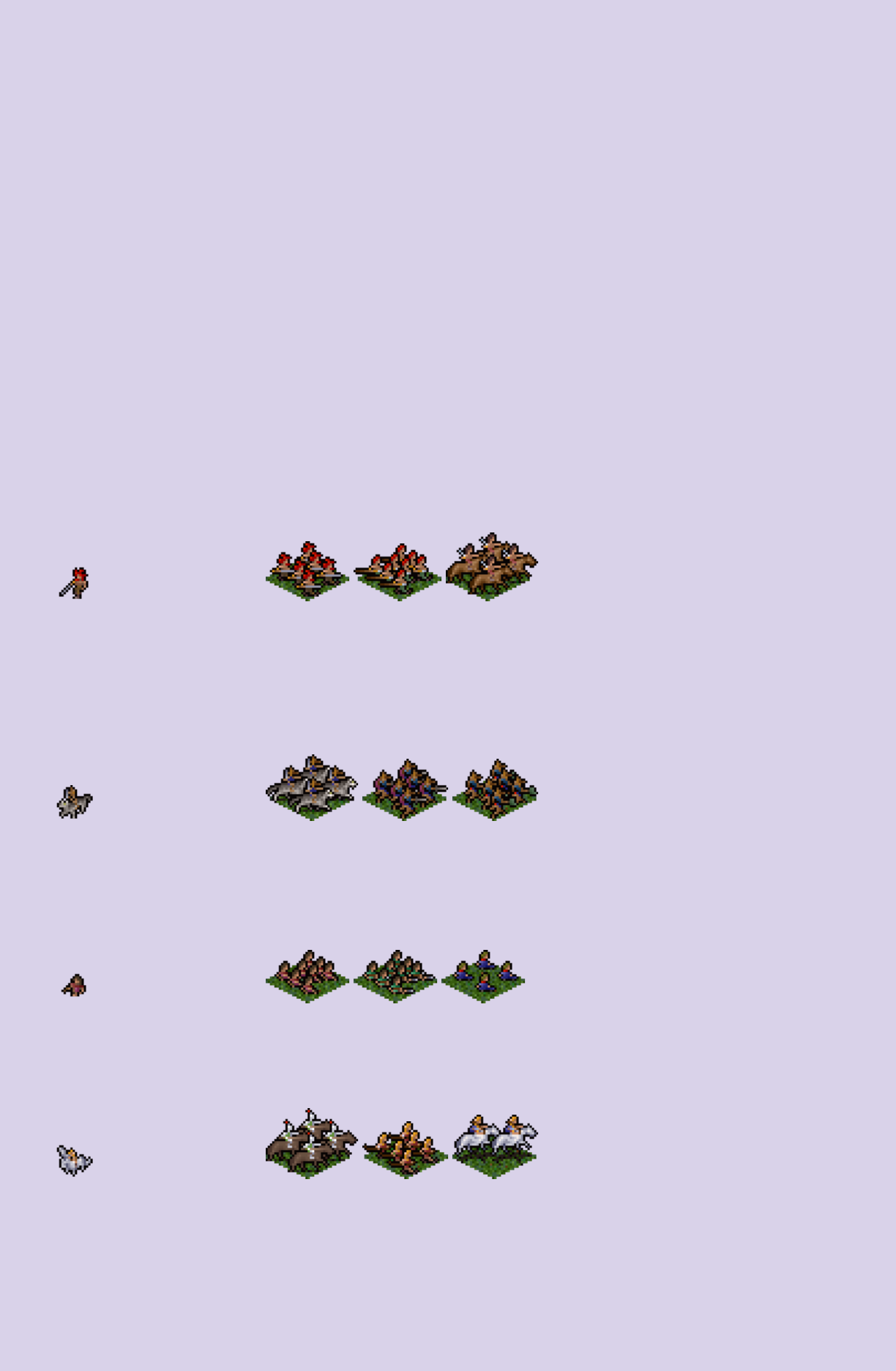
Your People
The races of Arcanus and Myrran are spread out throughout a vast landscape. Arcanus is the lighter
of the two worlds, much like a mystical version of your own ‘Earth’. Here the likes of elves, men, orcs
and lizardfolk roam. Myrran is its darkened twin, with greater dangers coupled with greater rewards.
Eventually the two worlds will be connected, either through the portals hidden throughout the land, or
through spells in certain books of magic.
To begin on Arcanus, roll 1d10 repeatedly until you have two different numbers. Choose one of the
two races corresponding to those two numbers. If you do not like either race, you may afterward pay
50 CP to choose freely, or pay 100 CP to start on Myrran (see below).
You may assume that all nine of these races have been “balanced” in terms of which is most likely to
help you win, though some have synergies with certain magic. A life wizard, who prefers to avoid
direct war, for example, may prefer a race better at building than at warfare. Below you can see some
information about each of the races. If you wish to know more, consult the links above. Note that this
is just the race you start as the leader of, and you may conquer towns of other races, both neutral
towns and those of other wizards. Some races may not be happy about being ruled by certain others,
though. If you try to rule elves as an orc, you’re going to have some problems with rebellion…
(1) Barbarians
Ferocious people of the north.
Barbarians are genetically compatible with High Men and Nomads, but burn with a far greater thirst
for combat. They have ferocious baseline fighters, and reproduce rapidly, but are not very good at
maintaining an advanced empire on their own, lacking the ability to produce the higher-tier buildings.
Plan to expand rapidly to utilize the talents of the other races that you conquer. Their unique unit is
the 6-figure Berserker troupe, which has a very high melee attack, as well as throwing axes.
(2) Gnolls
A mammalian, canine humanoid,
gnolls are physically stronger than any other race on Arcanus. They are in many ways even less
developed than Barbarians, and similar expansionary strategies are best. However, they lack the
extreme bloodthirstiness, and are thus better at assimilating with other races. Their unique unit is the
4-figure wolf rider, which is an extremely fast unit that does not require much development.
(3) Halflings
Halflings are a unit inclined to
peace and prosperity, but are all too often underestimated. They receive bonuses to farming, and a
luck bonus. Each soldier is individually weaker, but units are composed of more figures. Their unique
unity is the 8-figure halfling slingers, which become especially deadly when enhanced by magic.
(4) High Elves
Civilizations of high elves grow
very slowly, but at the height of their development they are rivaled on Arcanus only by High Men.
They suffer from very low population growth, but are the only race on Arcanus whose populace
generates mana simply by living. They can build most of the available buildings, and all elven units
receive a bonus to hit their targets. Unique units are the 4-unit Elven Lords, the 6-unit Elven
Longbowmen, and the 2-unit Pegasi.
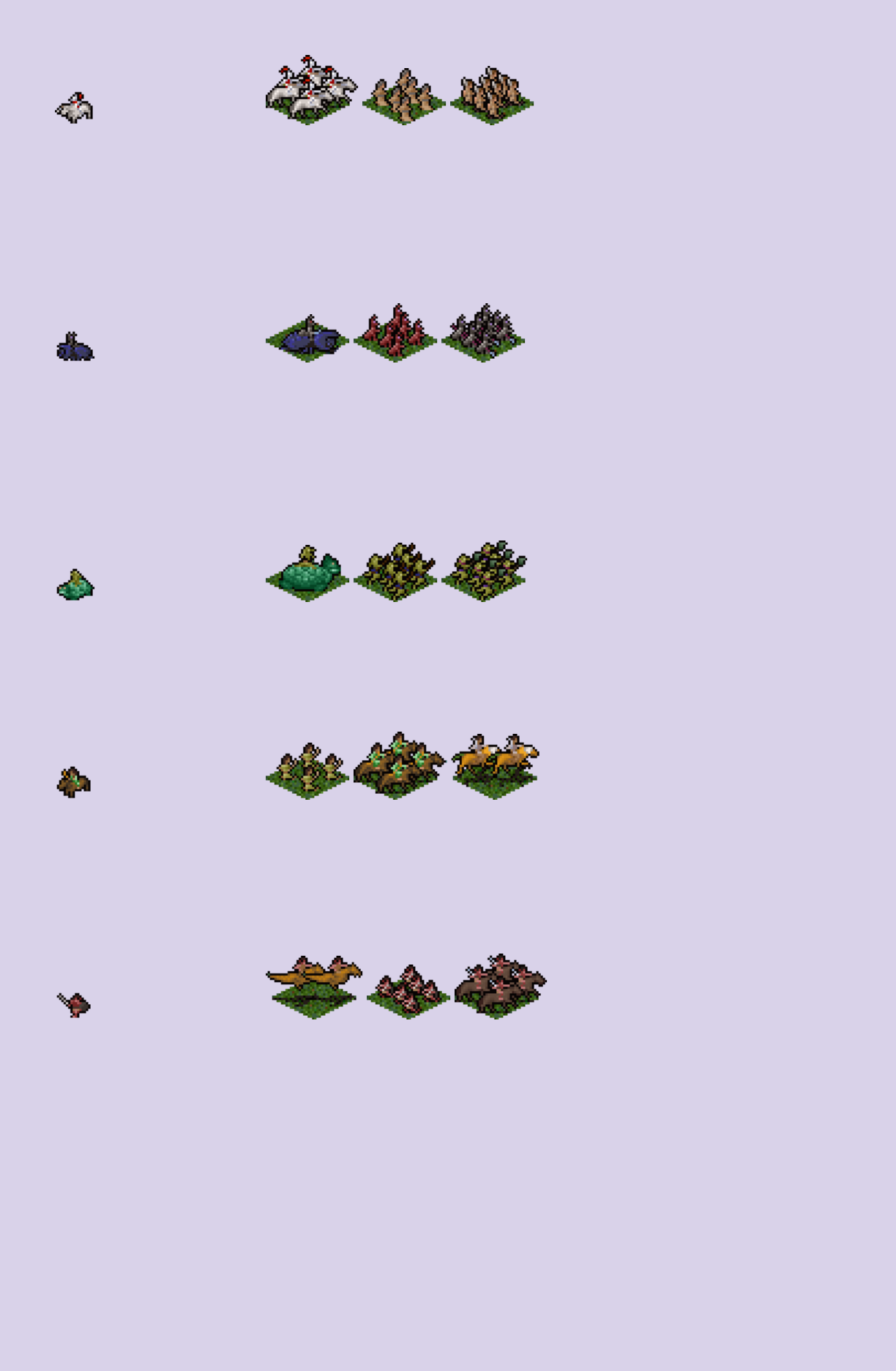
(5) High Men
High men are genetically
compatible with barbarians and nomads, but grow the most slowly of the three. This is another slow
burn race, that achieves great heights of power eventually. In the long run, they can build every
standard unit, from engineers to magicians to priests to pikemen, as well as nearly every building
(lacking only the Stable of Fantastic Creatures). Their units have no inherent bonus, but their unique
unit, the 4-unit Paladins, is arguably the most powerful “standard” unit in the game, with near
complete immunity to magic among a host of other benefits.
(6) Klackons
An insectoid, hive-oriented
society, Klackons are a purely expansionist race, and receive a significant production boost from the
beginning. In light of their lack of creativity, some other races will eventually overtake their production,
but no one but Dwarves can compete right from the start. Klackon society is abhorrent to most other
races, and assimilation into a Klackon empire will meet extreme resistance. Their unique unit is the
powerful 1-unit giant stag beetle, which, by the time you can first build it, is extremely strong relative
to other units, but it is eventually overtaken.
(7) Lizardmen
Lizardmen are about on par with
Gnolls for society development. In place of the extreme strength of the gnolls, they have an excellent
swimming and water-breathing ability, as well as tough and hardy skin, increasing the defense of all
units. They do not need to build ships, as their units are easily capable of traversing great distances
of water. Their unique units are the 1-figure Dragon Turtle, and the 6-figure Javelineers.
(8) Nomads
Nomads are genetically
compatible with Barbarians and High Men, and in between the two in terms of population growth,
developmental capability, and building availability. They are masters of mobility, which is reflected in
their unique units: The 4-figure Pathfinding Rangers can lead armies swiftly through wilderness, the
4-figure horsebowmen are exactly what the name implies, and the 2-figure griffins are an excellent
mid-to-high tier unit.
(9) Orcs
Orcs in Master of Magic break
the stereotype by actually being quite advanced. They are capable of building most buildings, and are
ultimately extremely average in most areas. They have nothing remarkable, but nothing holding them
back. Their unique unit, the 2-unit wyverns, are some of the most powerful normal units available, but
take time to build to (almost as long as Paladins)
(10) Free Choice: Your lucky day! You get to pick any of the above races of your choice.
Myrran is a darker world, but also contains greater power and resources. The dangers are higher, as
are the rewards. Magical nodes on Myrran generate twice the power, and are guarded by greater
foes. Ancient ruins reveal deeper secrets. Travel between the two worlds is eventually possible, but
starting on Myrran can be a boost early on, and allows you to choose a more powerful starting race.
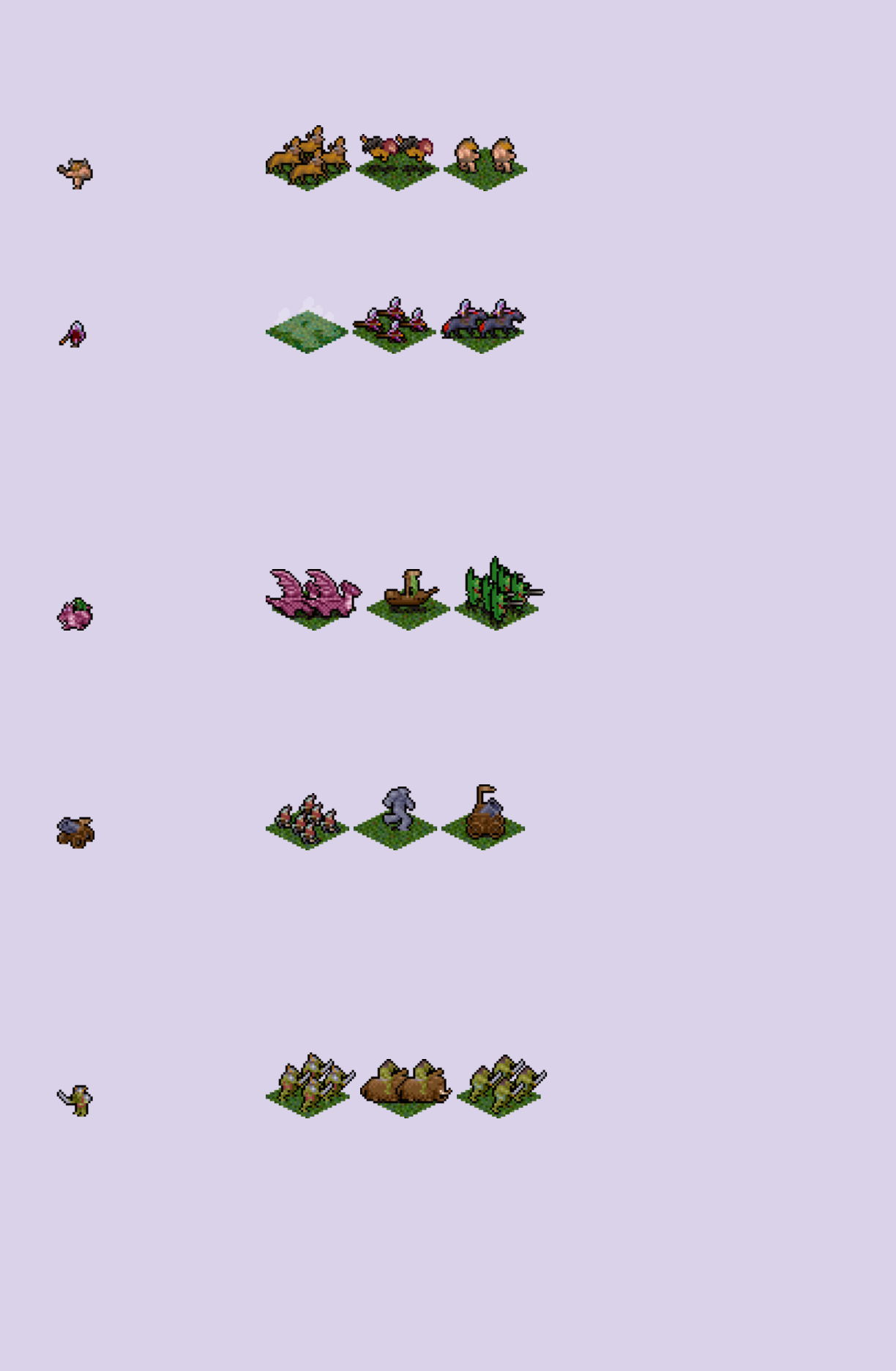
To start on Myrran, pay 100 CP. Then, roll 1d10 until you have two races from the list below.
Choose one of them to begin playing with, or pay an additional 50 CP to choose freely.
(1-2) Beastmen
The beastmen are a confederacy
of demi-human and intelligent beast races. They are above average in all areas: development,
population growth, magical units, etc. They are, as a whole, both cunning and strong. Their unique
units are the 4-unit centaurs, the 2-unit manticores, and the 2-unit minotaurs.
(3-4) Dark Elves
The dark elves are as twisted as
they are powerful. Due to constant infighting, they have the slowest population growth rate of all
races, and the worst compatibility with assimilation of any race. Each dark elf contributes mana to you
(twice as much as High Elves), and they are absolutely deadly at their (slow to come) peak. Every
unit is capable of some level of magical attack, and their unique units are impressive. The six-unit
Nightblades are invisible to any unit not adjacent to them, and have a deadly poison attack. The
four-unit warlocks have the most powerful magical attack of any normal unit, and an armor-piercing
Doombolt spell. The 2-unit Nightmares are flying, fast, heavy hitters.
(5-6) Draconians
The draconians are a race of
humanoid reptilians, descended from true dragons. Every draconian can fly, and has increased
defense and resistance, as well as a moderate fire-breathing ability. Their growth and production are
average, but they can eventually build most buildings. Their unique units are the 2-figure Doom
Drakes, which is as close as you are going to come to a dragon without magically summoning one,
and the 1-unit flying airship, which acts as powerful flying artillery.
(7-8) Dwarves
Dwarves are the masters of
production and mining. They receive increased production (like Klackons), but don’t suffer the
building restrictions of the insectoid race. They get double the bonus from any mineral deposits as
well, can pass through mountainous terrain rapidly, and have extremely high constitutions and
resistances to magic. They are slow to grow their population, and are the only “good” race in Myrran,
which makes them much more easily adapted into an empire with Arcanus races. Unique units are
the six-figure hammerhands, which pack a major punch, the 1-figure Golem, a deceptively fast and
heavy hitter, and the 1-unit Steam Cannon, a powerful artillery.
(9-10) Trolls
Trolls are borish, dull and brutal.
They grow slowly, and their building capability is restricted, as is their units’ capabilities with magic.
But they have a defining advantage: regeneration. In addition to high strength and health, units not
completely killed will cure their wounds even during battle, recovering from anything short of
decapitation or fiery death. This makes them hard to keep down. Unique units are the 4-figure War
Trolls, which represent the pinnacle of their relentlessly destructive capabilities, and the 2-unit war
mammoths.

Background
Choose one. Personality effects mentioned can be controlled and mastered with will.
Drop-In: No knowledge of the setting, but you seem to have an instinctual understanding
of the neutral arcane magics that underlie artifice, and the summoning of great heroes. A good choice
if you prefer your magic to work through items. Your personality is not affected.
Life
: You have spent many years as a great healer pulled toward the magics of life, purity,
holiness and healing. You have a strong wish to maintain peace and prosperity whenever possible.
This may make it difficult to go to war, even when it is in your interests to do so.
Death
: You have spent years mastering the magics of undeath, corruption, pestilence and
draining the power of others. You have the strong desire to wither the living and corrupt the pure. This
makes it difficult to maintain the morale of your townsfolk and normal soldiers (if any!)
Chaos
: You have spent years enthralled by the destructive power of fire and chaos, and the
harnessing of demons and elemental beings. You have the strong desire for conquest through
destruction. This may make it difficult to rebuild conquered towns into useful settlements.
Nature:
You have spent years communing with the magic of nature, and you adore the
more subtle magics of guidance, protection, the summoning of fairies, wyrms and earth elementals.
You have the strong desire to achieve harmony of nature and civilization, and to commune with the
beasts of the world. This may make you somewhat inattentive to more pragmatic concerns.
Sorcery
: You have spent years harnessing the wind and mind, illusion, and meta-magic.
You are very arrogant about your power to non-wizards, and have the strong desire to prove the
supremacy of magic. This may cause heroes that work under you to resent you, as well as lead you
to try to use magic to solve every problem, when more mundane solutions would suffice.
Dual-Focus
(200 CP): You have split your attention equally between two fields of magic,
other than life and death. The “Book” perks for these two fields of magic are discounted for you up to
the tenth book, including the free books for each, but none of the other perks are discounted/free. You
may purchase the eleventh book at full price, of course. You receive slightly milder versions of the
personality complications from both of your chosen fields. If you choose life and chaos, or nature and
chaos, or nature and death, you may suffer some inner turmoil…
Tri-Focus (300 CP): With this background, you have split your attention equally between three fields of
magic, which can’t include both life and death. You receive the allocated free books of each field, and
can purchase up to the seventh of ten books at a discount for each, and are able to purchase
additional books at full price. You have no other discounts or free perks. You receive very mild
versions of the personality complications from all of your chosen fields.

Perks
The Weight of the Years (0 CP): You might be here for a long time. Could get dull at times. What
this ability allows you to do is to put yourself on autopilot. Your autopilot self won’t be quite as capable
as you are, but can handle routine with no problem at all. You can set conditions, or a length of time,
at which the autopilot will end. e.g. “Until I finish mastering this spell, or someone attacks my empire,
or a year has passed.” You will not be consciously aware of the time passing during this period, but
can access knowledge gained during the time (subject to the normal decay of memory; the ability
does not inherently grant perfect recall unless you have that from elsewhere). If you do not explicitly
set a different time limit condition, your auto-pilot will not last more than one year before bringing you
back to reality; it will also always end if you are (personally) attacked.
Place of Power (0 CP): You have the ability to create a unique place of power aligned with your
magic. The process is costless, but requires several days of attunement to the location along with
ritual effort. Most wizards choose to place theirs within a highly defensible fortress, but all that is
necessarily is the area of a small room. Within this place of power you are able to project spells
across the entire world. More localized spells do not require use of a place of power, and once a spell
is cast, you need not remain in the place in order to maintain it. You may not have more than one
such place at a time.
Node Mastery (100 CP; requires at least two each of Books of Chaos, Sorcery and Nature):
All magical nodes, in both worlds, generate twice as much mana for you. Additionally, you have no
trouble with interference from the extreme power of these nodes in casting your own spells near
them. In other jumps, this will increase the amount of magical power that you can draw from external
sources.
Archmage (200 CP; requires ten Books of one type): You truly have the potential to ascend to
be one of the great wizards of all time, and are a master of casting. Your casting skill (the ability to
channel more magic, more quickly) improves rapidly, and your enchantments are twice as hard to
dispel. In future jumps, this will increase the cap on the amount of “power” you can safely use at once
when using any magical ability.
Channeler (200 CP): You are a master at maintaining spells efficiently. The necessary energy to
maintain any ongoing magical effects is halved for you, and magical enchantments that have a set
duration last twice as long.
I Am The Fortress (300 CP): Other wizards may hide in their fortresses, but not you. Once
attuned to a place of ritual significance, you retain the benefits granted by it even after leaving. Here
this means that as long as your place of power is intact, you retain its benefits wherever you are. You
cannot be “attuned” to more than one location at a time in this way.
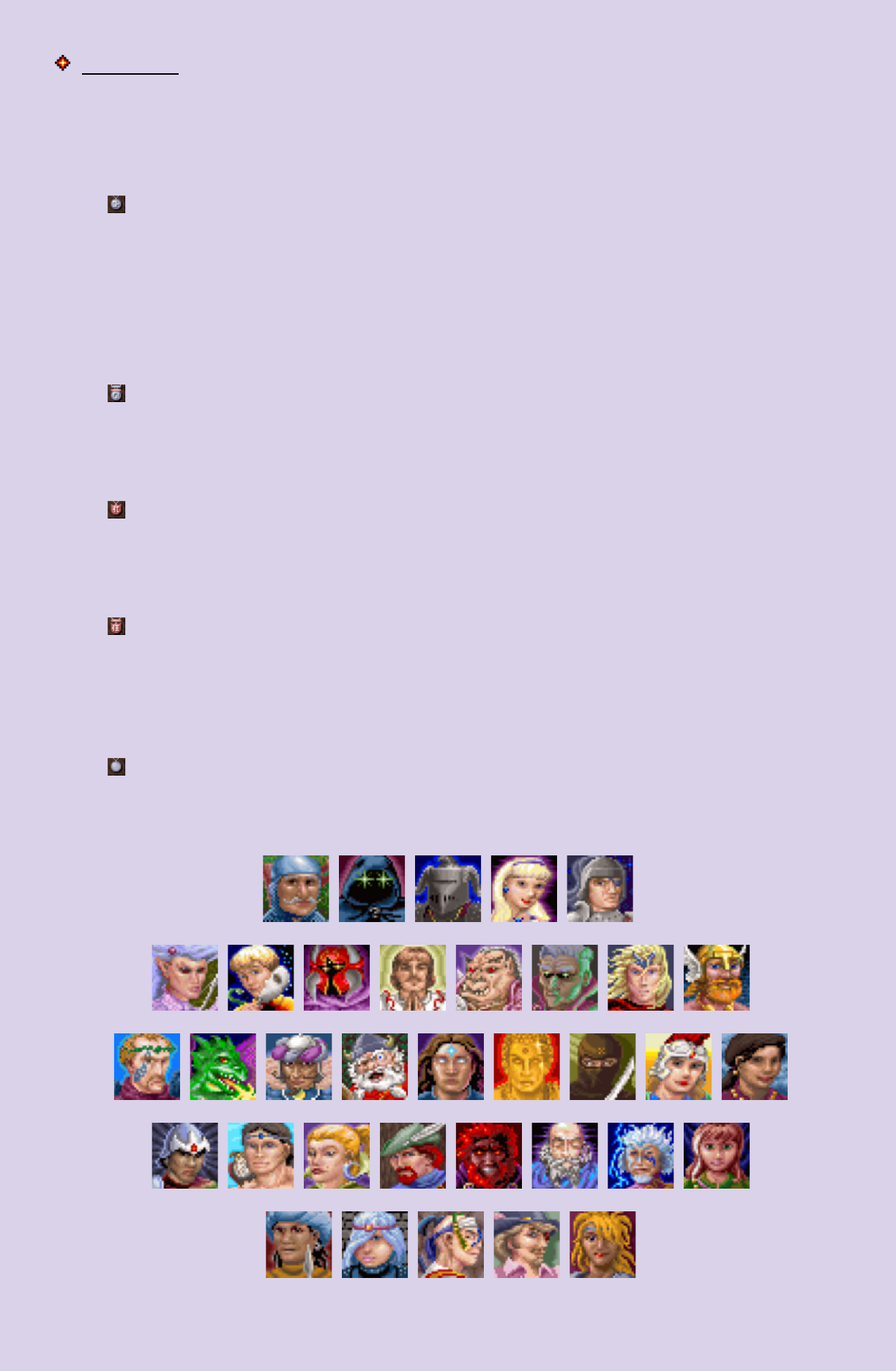
Companion (0 CP or 100 CP): Bring a companion! The below five methods are the ONLY way to
have anyone accompany you. Companions do not gain the powers of a wizard, or any CP.
Companions are unaging while in this world, and you can bring in as many as you like, including
‘inactive’ ones, but no more than 8 may take on the powers of a hero in Master of Magic (the first
three options).
Let’s Play ‘Hero’! (0 CP): Your companion’s previous powers are replaced with the
powers of one Hero of your choice, barring Torin the Chosen one, until the jump ends. They
are indistinguishable in power from that hero, but have the personality and memories of their
own self. They do not start with you, must be summoned with the appropriate spell, and cannot
be summoned by enemy wizards. Note that the more powerful the Hero whose powers they
take, the longer it will take you to “summon” them. For 50 CP per companion, they retain the
powers they copied post-jump.
Joint Ascendency (100 CP, requires “Ascendency” drawback): As the previous option,
except that this companion’s pre-jump powers will slowly return, like yours. They will reach the
height of their previous power at the same time you reach the height of your power as a wizard
here. They retain the powers of the hero they copied post-jump.
Double-Up! (100 CP, cannot be chosen with “Gaming Classic” or “Ascendency”
drawbacks): Bring a companion with their powers intact. They begin the game at your side. In
addition, they gain the powers of one of the heroes (barring Torin the Chosen One), and count
as a hero under your command. They retain the powers of the hero they copied post-jump.
Heroes? We Don’t Need No Stinkin’ Heroes! (0 CP, cannot be chosen with “Gaming
Classic” or “Ascendency” drawbacks): Bring a companion with their powers intact. They
begin the game at your side. They do not gain the powers of a hero, or count as a hero, or gain
any inherent access to the magic system of this world that heroes might normally have. [This is
the normal “companion comes with you” option]
Just Visiting (0 CP): Companions brought in with this method retain no powers from
previous jumps (though they get them back at the end), and gain no powers while here. They
can basically hang out and keep you company.

Artifice & Arcane (Discounted for Drop-In)
Runic Aid (100 CP, free for Drop-In): Normally a wizard would have to know a spell themselves
to be able to craft an item with its properties (such as the ‘Invulnerability’ spell creating a Breastplate
that turns away almost all weapons). For you, as long as you have another who knows the desired
spell willing to aid you, you can use your superior crafting skills to make such an item. In this jump,
this applies to both Heroes who have spellcasting capability (of which there are many) as well as
allied wizards (who might be willing to work out a mutually beneficial arrangement).
A Smattering of Books (100 CP): Each time you take this you get one book of magic. However,
you must always select the type of magic for which you have the fewest books among Life, Death,
Nature, Chaos and Sorcery. The exception to this is that once you select Life or Death, you cannot
(and therefore do not have to) select the other.
So, for example, if you have purchased this twice to get one Nature and one Life book, if you
purchase it a third time you must choose either a Chaos or Sorcery book. You may use book perks
under other backgrounds after purchasing this to diverge from this pattern.
Artificer (200 CP): You begin the game already knowing the magics to create enchanted items
(other wizards eventually acquire them) and artifacts. These items cost half as much for you to make,
and take half the time. This allows you to equip heroes you hire early game. In future jumps, this will
provide a slight boost to the creation time and a reduction to the creation cost of magical items.
Magic-Forged Arms (200 CP): You have taught your smiths to utilize craft-magic in their work,
and all new troops under your command are created with magic forged weapons, allowing them to
bypass normal weapon immunity, and granting an increase in their accuracy. In other settings you can
teach this skill to others, allowing you to slowly industrialize the production of low-grade magic
weapons and armor. Such items are not artifacts, and cannot be sundered to gain mana. [Note that
this effect can be replicated by Alchemists’ Guilds in this setting, though not all races can build such
guilds, and it takes a while to get to that point of city development regardless. This perk gives you the
bonus right from the beginning, and allows you to teach the crafting methods in other jumps as well]
Alchemy (300 CP): While all wizards are capable of converting gold to mana, and vice versa, the
process is very inefficient for them, losing half of the value in the process. You can do it perfectly,
without any loss, making it potentially feasible for you to power your magic through taxation, for
example. In future jumps, this will provide a boost to alchemical abilities, especially those converting
one substance into another. You only retain the ability to convert gold to mana (and vice versa) in
future jumps if you purchase this ability, which would provide one way to obtain mana in the future.
Runemaster (400 CP): All wizards have access to the arcane magics, but only you are a master
of them. This halves the time it takes to learn these spells, as well as the energy costs of casting and
maintaining them. In future jumps, this boost applies to any artifact creation magic, as well as any
magics that would not benefit from the aligned perks under other backgrounds. Thus magic aligned
to life, death, chaos, nature, time, the mind or meta-magics is excluded. [Note that this bonus stacks
with Artificer for an unparalleled artifact creating master.]

Life & Harmony (Discounted for Life Background)
A Righteous Ruler (100 CP, free for Life): You have the divine right of kings, the common
people know it, and you are loved for it. In this jump, unrest is reduced by 1 in all cities. In future
jumps, those who you rule over are much more likely to accept that you have their interests in mind.
Book of Life (100 CP, up to eleven. Two free for Life. May not take with Book of Death):
Artifact level books of life magic that are bound to you irrevocably, allowing you to know and learn
spells of life. Each book will increase the breadth and depth of the types of spells you are eventually
able to cast, through training and research over the years. With ten, you will eventually be able to
master all life magics. See Appendix for more details.
Make Love, Not War (200 CP): You have gained an additional victory condition. If you are able to
forge a wizard pact with every remaining living wizard, simultaneously, then you will be considered to
have won the game. Note that a wizard pact is much more intense than a mere alliance, and
represents the utmost trust and respect between the parties. Good luck forming such a pact with a
death or chaos wizard. In other contexts, this will make you extremely good at getting opposing
parties to agree to peaceful negotiations, and to negotiate in good faith.
Arch-Angel (200 CP): As soon as you learn the spell Arch-Angel in-setting, you immediately
summon one to your side. This Arch-Angel is perfectly loyal, takes no mana to maintain, and is
immune to effects that specifically target summoned creatures. If destroyed, it is reformed one year
later (next turn, in jump). It is a named entity, and can act as a companion if desired. If you never
learn the spell in-setting, you gain the Arch-Angel upon winning the jump.
Divine Power (300 CP): You have dedicated yourself to the higher path of righteousness and
light. Your life spells will be learned faster, cost less mana to cast and maintain, and be more difficult
to dispel. Time and costs are not halved, but the boost is significant. Your holy buildings generate
more mana and pacify more of the populace. This perk also provides its boost to any other
life-aligned magics you receive from other jumps.
Charismatic & Famous (400 CP): You are well known as a paragon of virtue, fair dealings and
righteousness. Heroes will be apt to flock to your banner (and can be hired for less!), merchants will
flock to your empire, assured of safety, with goods to sell. Other wizards will, in absence of
counter-evidence, trust that you will deal fairly. You find yourself able to easily put their concerns at
ease as well. In future jumps, if you have a position of rulership, the same effect applies. If not, you
will find that there are positive rumors about you whenever you visit somewhere for the first time. Not
enough for people to throw gifts at you, but enough so that they will be disposed to deal with you in a
friendly and gracious manner. You may “turn off” this ability before starting a jump if you so choose.

Death & Desiccation (Discounted for Death Background)
Fearsome Reputation (100 CP, free for Death): You are terrifying, and you own it. Your enemies
know that you aren’t bound by common decency. As a result, threats you make are much more likely
to be believed (whether or not you are bluffing), and you find it easier to cowe those less powerful.
Book of Death (100 CP, up to eleven. Two free for Death. May not take with Book of Life):
Artifact level books of death magic that are bound to you irrevocably, allowing you to know and learn
spells of death. Each book will increase the breadth and depth of the types of spells you are
eventually able to cast, through training and research over the years. With ten, you will eventually be
able to master all death magics. See Appendix for more details.
Zombies Are People Too (200 CP): Civilized people, as a rule, find the undead pretty disturbing.
You can change all that! You now have an amazing knack for putting just the right spin on the undead
so that they don’t seem so bad, really. In this jump, this eliminates the morale penalty that your
citizens and soldiers would receive from having undead around (it won’t necessarily prevent them
from being disturbed by the zombies eating people in front of them, but they won’t mind the zombies
themselves, as long as they stay upwind). Note that this does not protect from the negative diplomatic
and morale effects of doing things like spreading plagues and sucking out the souls of enemies.
Further, you are able to shift the views that allies and potential allies hold about the undead closer to
the positive through only a few minutes talking (works for speeches too!)
Demon Lord (200 CP): As soon as you learn the spell Demon Lord in-setting, you immediately
summon one to your side. This Demon Lord is perfectly loyal, takes no mana to maintain, and is
immune to effects that specifically target summoned creatures. If destroyed, it is reformed one year
later (next turn, in jump). It is a named entity, and can act as a companion if desired. If you never
learn the spell in-setting, you gain the Demon Lord upon winning the jump.
Infernal Power (300 CP): You have dedicated yourself to the dark path of undeath and despair.
Your death spells will be learned faster, cost less mana to cast and maintain, and be more difficult to
dispel. Time and costs are not halved, but the boost is significant. Your unholy buildings generate
more mana and cowe more of the populace. This perk also provides its boost to any other
death-aligned magics you receive from other jumps.
Master of Undeath (400 CP): You can learn and cast spells pertaining to the creation and
summoning of undead much more readily. Such spells take half the time to learn, and half the energy
cost to cast and maintain. Your undead minions also receive a boost to their power. In other jumps,
this provides a boost to any magics of undeath and allied undead.

Chaos & Destruction (Discounted for Chaos Background)
War! What is it Good For? Everything (100 CP, free for Chaos): You love war. No, I mean, you
really love war; it makes you feel alive! Whenever you are involved in a war (between two opposing,
civilized forces), the damage that you, with weapons or magic, deal in conflicts in the war is
noticeably increased.
Book of Chaos (100 CP, up to eleven. Two free for Chaos.): Artifact level books of chaos
magic that are bound to you irrevocably, allowing you to know and learn spells of chaos. Each book
will increase the breadth and depth of the types of spells you are eventually able to cast, through
training and research over the years. With ten, you will eventually be able to master all chaos magics.
See Appendix for more details.
I Think It’s Just The Right Amount Of ‘Kill’ (200 CP): You like overkill, and sometimes this
upsets people you might want to be friends with. With this perk, those naive souls will be much more
okay with your tendency to burn armies to the ground. This makes it much easier to assimilate
peaceful races into a warlike empire, and makes it easier to get along with peace-oriented individuals
you might want to ally with. Don’t worry, though, those you want to be terrified will be no less so.
Great Drake (200 CP): As soon as you learn the spell Great Drake in-setting, you immediately
summon one to your side. This Great Drake is perfectly loyal, takes no mana to maintain, and is
immune to effects that specifically target summoned creatures. If destroyed, it is reformed one year
later (next turn, in jump). It is a named entity, and can act as a companion if desired. If you never
learn the spell in-setting, you gain the Great Drake upon winning the jump.
Chaos Mastery (300 CP): You have focused so entirely on the forces of chaos that you embody
it. Your chaos spells will be learned faster, cost less mana to cast and maintain, and be more difficult
to dispel. Time and costs are not halved, but the boost is significant. Additionally, you receive twice as
much mana from any nodes of chaos magic that you control in the worlds. This also provides its
boost to any other chaos-aligned magics you receive from other jumps.
Warlord (400 CP): Your troops are inspired to new heights of aggression and martial prowess. All
normal units and heros in your empire have their effective level increased by 1 in determining the
bonuses to hit, defense, attack, etc. These units can achieve the “Ultra Elite” experience level, which
is not possible normally. In future jumps, troops under your command, whether directly or in a rank
above them, act much more experienced than they normally are. This does not directly grant them
numerical bonuses (unless so dictated by the setting), but they are noticeably more competent and
skilled.

Nature & Harmony (Discounted for Nature Background)
Walk the Path (100 CP, free for Nature): You know the hidden pathways of the land. Those
under your command (which includes all units in your civilization in this jump) move at twice the
speed through natural settings (to a maximum pace of that which could be made over a well-made
road). In a natural setting you, personally, are never lost and always know the most direct path to your
destination, as long as you know where the destination is.
Book of Nature (100 CP, up to eleven. Two free for Nature.): Artifact level books of nature
magic that are bound to you irrevocably, allowing you to know and learn spells of nature. Each book
will increase the breadth and depth of the types of spells you are eventually able to cast, through
training and research over the years. With ten, you will eventually be able to master all nature magics.
See Appendix for more details
Bounty of Nature (200 CP): You are adept at coaxing a great and plentiful harvest from nature
itself. In this jump, forests and hills generate twice the food that they otherwise would, while keeping
the production bonus they normally provide. In future jumps, as long as you are in a place where
edible plants of some kind grow, you can feed dozens of people a day with ease. By spending an
entire day communing with the plants, you can double the harvest of one hundred square miles (only
works once per harvest).
Great Wyrm (200 CP): As soon as you learn the spell Great Wyrm in-setting, you immediately
summon one to your side. This Great Wyrm is perfectly loyal, takes no mana to maintain, and is
immune to effects that specifically target summoned creatures. If destroyed, it is reformed one year
later (next turn, in jump). It is a named entity, and can act as a companion if desired. If you never
learn the spell in-setting, you gain the Great Wyrm upon winning the jump.
Nature Mastery (300 CP): You have focused so entirely on the forces of nature that you embody
it. Your nature spells will be learned faster, cost less mana to cast and maintain, and be more difficult
to dispel. Time and costs are not halved, but the boost is significant. Additionally, you receive twice as
much mana from any nodes of nature magic that you control in the worlds. This also provides its
boost to any other nature-aligned magics you receive from other jumps.
Conjurer (400 CP): You can learn and cast spells of fantastical summonings much more readily,
excluding summonings of the undead. Such spells take half the time to learn, and half the energy to
cast and maintain. In other jumps, this provides its boost to any magics that summon creatures to aid
you, excluding undead and demons. Summoned creatures are also more loyal than they otherwise
would be, and half again as powerful.

Sorcery & Secrets (Discounted for Sorcery Background)
Do Not Meddle in the Affairs of Wizards (100 CP, free for Sorcery): You have no time for the
pretensions of charlatans and lower practitioners. Whenever an enemy who is aware of your
presence, and who is clearly your inferior in the magical arts (meaning you know it, and they know it)
uses magic in your presence their magic is notably less powerful, and is prone to failure. A competent
foe will not have trouble finding a way around this. In this jump, this applies to magic cast by heroes
and basic units, but not enemy wizards.
Book of Sorcery (100 CP, up to eleven. Two free for Sorcery.): Artifact level books of sorcery
magic that are bound to you irrevocably, allowing you to know and learn spells of sorcery. Each book
will increase the breadth and depth of the types of spells you are eventually able to cast, through
training and research over the years. With ten, you will eventually be able to master all sorcery
magics. See Appendix for more details.
It’s Not Arrogance If It’s True (200 CP): Sure, you’ve got a big head, but you deserve to! People
have a tendency to accept your arrogance as an endearing quirk… if you really are that good. This
mitigates most of the negative effects of your potentially abrasive personality on diplomacy and
interaction with allies and potential allies… provided you can back it up.
Sky Drake (200 CP): As soon as you learn the spell Sky Drake in-setting, you immediately
summon one to your side. This Sky Drake is perfectly loyal, takes no mana to maintain, and is
immune to effects that specifically target summoned creatures. If destroyed, it is reformed one year
later (next turn, in jump). It is a named entity, and can act as a companion if desired. If you never
learn the spell in-setting, you gain the Sky Drake upon winning the jump.
Sorcery Mastery (300 CP): You have focused so entirely on the pure magics of sorcery that you
embody it. Your sorcery spells will be learned faster, cost less mana to cast and maintain, and be
more difficult to dispel. Time and costs are not halved, but the boost is significant. Additionally, you
receive twice as much mana from any nodes of sorcery magic that you control in the worlds. This also
provides a boost to any magics you receive from other jumps focused on the mind, time, or the
manipulation of other spells (such as dispelling magics).
Sage Master (400 CP): You are a master of hidden secrets. You read rapidly, and will learn all
new spells nearly twice as quickly. This also improves your memory and retention to just beyond the
peak of human ability if you do not already have such an ability, and gives a slight boost to
intelligence, as well as making you exceptional at deciphering hidden codes and languages.

Items
Nodes (150 CP, or 300 for one of each): You can take with you a Chaos, Nature or Sorcery Node
that you have connected to in jump. This will be a fraction of your power at the end of the jump, but
not an insignificant one. These Nodes are placed in-setting in future jumps. You are automatically
connected to them and draw the power from them. If destroyed (yikes) they respawn next jump.
Artifact (200 or 50 CP for three): Selected artifacts; they must be craftable in-setting (not books).
The cost is 200 to begin the jump with the artifacts, or 50 CP to be able to make three artifacts that
are fiat-backed in-setting. Artifacts sacrificed for mana do not respawn until the next jump. See
https://masterofmagic.fandom.com/wiki/Item_Crafting for the kinds of things that are possible.
City (200 CP): A single city, along with the lands in its territory (minus nodes or portal towers, but
including mineral deposits), can be brought as an attachment to your warehouse, or imported into
future settings; in the latter case the details of the city may adjust to the setting. The choice can
change each time. If imported, you decide if the population is consistent, or newly generated for each
jump with the old left behind. It retains its ability to train units and generate mana, and those
units/mana are under your direction.
Spellbooks & Retorts
As noted under the perks, books are linked to you ‘irrevocably’. The same is true of opposing wizards.
Just as in the game, you cannot take their spellbooks, nor learn from them. They will work only for
that wizard while they exist, and become unusable, or destroyed, when the wizard ceases to exist.
Just as in the game, it is possible to find additional books in deep ruins and the hardest dungeons,
though this is a rare occurrence. These are presumed left from another time, perhaps the were
created unbonded. In any case, they will be bound to the first wizard to discover them (which may not
be you!). You can safely assume 3 such books exist in the two worlds, or roll 1d5. The books
themselves are also random among Life, Death, Chaos, Sorcery and Nature, though somehow if you
have a Book of Life you will never find a Book of Death, and vice versa. You can exceed the eleven
book purchase limit in this way.
If you wish, you may also choose to roll for additional retorts that may exist in the dungeons, such as
Warlord, or Alchemist. You can assume that (on top of the books) 3 such retorts (or 1d5) exist among
Alchemy, Warlord, Channeler, Archmage, Artificer, Conjurer, Sage Master, Divine Power, Infernal
Power, Famous, Runemaster, Charismatic, Chaos Mastery, Nature Mastery, Sorcery Mastery, Mana
Focusing and Node Mastery. However, these retorts are the version given by the game, and grant the
corresponding game benefit for the duration of this jump only; they do not grant the perk.
Companion Wizard
If, and only if, you form a wizarding Pact with an opposing Wizard you may choose to take one (and
only one) with you as a companion for a cost of 200 CP. If you increase this to 300 CP, your chosen
wizard will be exempt from the effect of drawbacks that would otherwise make it impossible to form a
Pact with them. If you pay either of these costs, and fail to form a Pact by the end of the jump, then
you can spend the CP on other things before you go.
The companion wizard retains their powers and abilities from this jump, along with the same ending
bonuses that you receive. You cannot use their books. Not, “they won’t let you”, rather the books
simply do not work for you. In other words, this is not a cheap way to get more power for yourself.
They can, however, teach you spells they know directly if you have the requisite number of books
yourself (see Appendix).

Drawbacks
You can earn a maximum of 600 CP from drawbacks, unless you take “Ascending from Hell”, which
removes this limit. In that case you may earn up to 800 CP (by taking “Gaming Classic” and
“Ascending from Hell”). You may take any number of drawbacks for the challenge of it without
satisfying the conditions for taking them, but they yield no CP reward in that case.
Gaming Classic (+200 CP; cannot be combined with “Ascendency”): Powers you entered the
world with are locked while you are here. The exception to this are boosts to mental capability, though
such boosts are capped at the limit of normal human potential. You do not have access to your
warehouse, or any items from previous jumps, nor can you craft items not normally possible in this
world. The methods by which you can bring companions in are limited (see the Companion perk). If
the limitations on mental capabilities cause you to lose access to previous information or memories,
all of that is returned post-jump. You cannot lose anything permanently through taking this drawback.
Just as in game, you are limited to 13 spellbooks and 6 ‘retorts’. If you have more than 13 books
purchased, you select which you have access to for the duration of the jump. Similarly, if you ‘find’ a
spellbook in some ruins, and it would bring you above 13, you cannot use that spellbook until the
jump is over.
Ascendency (+100 CP): Powers you entered the world with are reduced down to barely
noticeable levels. The exception to this are boosts to mental capability, though such boosts are
capped at the limit of normal human potential. These powers will return to you slowly over the years
as your magical power grows, reaching their previous peak when your magical power here peaks;
this includes your mental boosts returning to their former level, if greater. The out-of-universe items
you are permitted to craft or acquire from your warehouse are limited appropriately by your growing
power levels as well. The methods by which you can bring companions in are limited (see the
Companion perk). You cannot lose anything permanently through taking this drawback.
Am I Late? (+300 CP): You start the game with the other wizards at the peak of their power, and
you have… nothing. You start on Arcanus with no settlements [ignore the section on race choice], and
must conquer one with your own power to gain a foothold. Hurry, though; some of your enemies may
not be too far from completing Spells of Mastery! Combine with “A Worthy Challenge” for the hardest
possible foes. [This is likely to be much shorter in duration; not recommended unless you are very
powerful indeed. Combining it with Gaming Classic or Ascendency is certain defeat.]
How Do You Work This Thing? (+100 CP): You can’t get nodes to function well, and receive
only half of their power. At the start of the game, when you have no nodes, this will not phase you.
Since the significant majority of a peak wizard’s mana is from nodes, this will be a problem later on...
Uh, Where is the On Button? (+200 CP, requires “How Do You Work This Thing?”):
Nodes do nothing at all for you now. You can still conquer them to deny them to enemy
wizards. You’ll have to rely on towns and alchemy for mana, but you’ll always have less than
your foes. [Very problematic if you do not have an alternate way to boost mana, such as
Divine/Infernal Power, or Alchemy.]
Secularism (+100 CP): Your shrines and other holy buildings generate no mana. This will be a
problem at the beginning, when most mana is derived from such. You will have to rely on alchemy at
first. Once you start getting nodes, this won’t be too debilitating, but good luck conquering your first…
Xenophobia (+300 CP, cannot be taken with “Am I Late?” or “You’re A Shifty Character…”):
Your starting race becomes completely and fanatically intolerant, and will invariably raze other
civilizations to the ground, murdering their populace to the last man, woman and child. This comes
with a boatload of problems, including extremely soured diplomatic relations with any wizards of
different races, and the complete inability to obtain the capabilities of any other but your starting race.

Is it Crowded in Here? (+100 CP): Normally, you would be competing against four other wizards.
Now there are eight. May not be too debilitating if you are able to manage diplomatic relations among
them, and if you aren’t too expansionary...
You’re a Shifty Character... (+200 CP; cannot be taken with “Xenophobia”): You have a bad
reputation, and none of the opposing wizards trust you. There’s just something about you that makes
them not want to take your word, or deal with you in any positive manner. They will under no
circumstance make an alliance with you, or make a wizarding pact. This and “Charismatic & Famous”
will nullify the other with regard to diplomacy.
Let’s Get Him/Her! (+200 CP, requires “You’re a Shifty Character…”): Now things are
even worse. Those wizards that wouldn’t trust you? Now they always regard you as public
enemy #1, and will always attack you when it is strategically sound for them to do so. Enemies
will often stop fighting each other and attack you instead. Expect to be in a state of perpetual
warfare. If you have this and “Charismatic & Famous”, then you suffer only the effects of
“You’re a Shifty Character…” instead.
A Worthy Challenge (+200 CP): Normally enemy wizards are built by approximately the same
standards you are, with 1200 points. Now, however, they are built using 1700…
Ascending From Hell (+600 CP, requires “Ascendency” or “Gaming Classic”; may not be
combined with any other drawbacks but those two): You suffer the effects of “Is it Crowded in
Here?”, “You’re a Shifty Character…”, “Let’s Get Him/Her!” and “A Worthy Challenge”. Good luck.
Pacifism (+100 CP, requires Life Book, cannot be combined with “Xenophobia”): You are
mentally unable to deal with war. Whenever you find yourself forced into a conflict with other wizards,
you are psychologically stretched to the limits, nearly halving the rate at which you acquire new
spells. Further, you can never, under any circumstance, raze captured cities, and must always try to
deal with your new subjects fairly, no matter their race.
Kingdom of Death (+100 CP, requires Death Book): Tales of the horrors of your kingdom have
reached far and wide. Merchants and mercenaries dare not enter, and you suffer a serious penalty to
trading income. Further, wandering heroes never present themselves to you, unless they themselves
are steeped in the magic of death.
Warlust (+100 CP, requires Chaos Book, may not be combined with “You’re a Shifty
Character…” or “Xenophobia”): The essence of your power is based in your lust for war. Starting
from the first time you make contact with another wizard, whenever you are at peace you draw half as
much mana from worship and from nodes. Best keep that war machine oiled.
Lure of Nature (+100 CP, requires Nature Book): Your obsession with natural connections
leads you to be more inattentive to material concerns than even other nature wizards, and this bleeds
over to your citizenry as well, who become less concerned with productivity. As a result, the finances
of your cities are not as healthy as they might otherwise be, and you lose a huge fraction of tax
income that would otherwise be coming in.
Supreme Arrogance (+100 CP, requires Sorcery Boo, may not be combined with “You’re a
Shifty Character…” or “Xenophobia”): Others may sneer at the inferiority of heroes and mere
mages, but you know that you are far above even other wizards. You cannot bring yourself to even
pretend to be on the same level as those simpering fools, and it shows. Alliances of convenience may
still be possible, but you would never lower yourself to make a true Wizard’s Pact with another.

The End is Here
First off, let me go ahead and remove the personality effects that accompanied your background…
If you lose...
All those advantages you came in with, and you still couldn’t cut it? Tsk. I expected better of you. Still,
you were entertaining for many, many years, and so as promised, you get to keep your powers from
previous jumps. Enjoy the real world again. It’s been… amusing.
If you win…
Ah, excellent! Most excellent! I knew you could do it. Now, you could stay here if you want? Be the
lord of these lands indefinitely?
No? You want to move on? If that is the case, be warned you won’t have access to all the magical
nodes and the thousands upon thousands of people in your civilization that you were able to draw
upon here for power. You have the spells you learned, but limited power to cast them, unless you
have another way to get very large amounts of mana in the future. I *do* have a gift that might help
with that. Take one of the following. If you won under “Gaming Classic”, you can have both!
Book of the Elements
This book contains a method to transform a place of great natural power or majesty into a magical
node. The process is slow (on the order of a year, most of which is waiting), and requires noticeable
rituals in the area, but will allow you to then draw upon that location to power the spells that you have
learned here.
Amulet of Divinity
In this world, you gained magical power through the worship of your subjects. This will allow you to
continue to gain power in this way, which you can use to power your spells and enchantments. Even
extreme admiration will provide you some limited mana flow, but nothing compared to true worship...
Beyond that, remember all those races that were part of your empire? From now on you will be able
to take the form of any of those races before starting a new jump, including the baseline racial
characteristics. This can, if you wish it to, override racial choices in a jump you are going to. You have
only one form of each race (or one of each gender if you have gender-switching capabilities). If you
have other shapeshifting abilities, you can also change to and from these forms as often as your
shapeshifting abilities work.
Further, in any future jump in which you are in control of, or managing an empire, country or people,
you may incorporate such integrated races into that empire. Any supernatural abilities or magic they
have has a tendency to warp to be more appropriate for the setting.
Oh! Lastly, it looks like some of the heroes who served in your armies would like to accompany you, if
you let them, as followers or companions.

Appendix of Spells & The Working of Magic
Spells in Master of Magic are divided into six categories: Arcane, Life, Death, Chaos, Nature, Sorcery.
All wizards are eventually able to develop all spells in the Arcane division, of which there are fourteen.
Each of the remaining five categories has 40 spells each, divided into four categories of ten: common
(C), uncommon (UC), rare (R) and very rare (VR). The more “books” in a category you have, the
more spells you will begin the game with, and the more you will eventually be able to access.
Books
Starting Spells
Learnable Spells (Including Starting Spells)
Bonus
1
None
4C
-
2
1C
5C, 3UC
-
3
2C
6C, 4UC, 2R
-
4
3C
7C, 5UC, 3R, 1VR
-
5
3C, 1UC
8C, 6UC, 4R, 2VR
-
6
5C, 1UC
9C, 7UC, 5R, 3VR
-
7
6C, 2UC
10C, 8UC, 6R, 4VR
-
8
7C, 2UC
10C, 10UC, 7R, 5VR
+10%
9
8C, 3UC
10C, 10UC, 9R, 7VR
+20%
10
9C, 3UC
All
+30%
11
10C, 4UC, 1R
All
+40%
Books beyond the 7th book provide an additive +10% bonus to research speed of that type, and a
-10% bonus to cost. This is capped at 13 books (+60%/-60%), the maximum attainable of one color.
Your books give you access to certain spells; these are the spells you can “learn” (see next section).
This is not, however, a hard cap on spell knowledge. In addition to the spells you can inherently learn,
wizards sharing books of the same kind can teach each other magic (usually as an exchange), and
occasionally spells can be found in ruins. However, you must have the power to inherently learn at
least one spell of the given tier to be taught spells of that tier. So, 1 book is needed for common, 2
books for uncommon, 3 books for rare and 4 books for very rare. Spell scrolls can sometimes be
found in ancient ruins as well, and these have the same requirement to learn as being taught a spell.
If you can’t use it, you may be able to trade it to one who can.
IMPORTANT: It is your choice which spells you start with. However, the rest of the ones that you
inherently learn are determined randomly. Meaning if you can’t inherently learn all spells of a given
tier, and you can’t get another wizard to teach you, you might miss out on the spell you wanted most.
If you are interested in the details of your jumper’s spellcasting capabilities, you can use 1d10 in
repetition to determine exactly which spells you will end up with. The order in which you gain the new
spells is also random, with the more common spells first, and the Arcane Spell of Mastery being the
last. The next section goes into more detail about how casting/learning spells works.
It should also be clarified for those unfamiliar with the setting that learning the Spell of Mastery is not
an “automatic win”. You have to also cast it. Casting it takes a long time, and everyone in the world
knows once you start casting it. There is plenty of time for an enemy to move an army to attack you.
I will not provide here a full description of every spell, but you can find those at the links given below.

List of Life Spells
Common: Bless, Endurance, Guardian Spirit, Healing, Heroism, Holy Armor, Holy Weapon, Just Cause, Star
Fires, True Light
Uncommon: Heavenly Light, Dispel Evil, Plane Shift, Prayer, Planar Travel, Planar Seal, Resurrection, Raise
Dead, True Sight, Unicorns
Rare: Incarnation, Holy Word, Altar of Battle, Angel, Mass Healing, Invulnerability, Lionheart, Righteousness,
Prosperity, Stream of Life
Very Rare: Holy Arms, High Prayer, Astral Gate, Arch Angel, Consecration, Charm of Life, Crusade,
Inspirations, Life Force, Tranquility
List of Death Spells
Common: Black Sleep, Cloak of Fear, Dark Rituals, Darkness, Ghouls, Life Drain, Mana Leak, Skeletons,
Terror, Weakness
Uncommon: Drain Power, Black Channels, Black Prayer, Berserk, Possession, Shadow Demons, Night
Stalker, Lycanthropy, Subversion, Wall of Darkness
Rare: Evil Presence, Black Wind, Cloud of Shadow, Cursed Lands, Famine, Warp Node, Wrack, Wraith Form,
Wraiths, Zombie Mastery
Very Rare: Evil Omens, Eternal Night, Demon Lord, Death Knights, Death Spell, Death Wish, Animate Dead,
Cruel Unminding, Pestilence, Word of Death
List of Chaos Spells
Common: Corruption, Disrupt, Eldritch Weapon, Fire Bolt, Fire Elemental, Hell Hounds, Shatter, Wall of Fire,
Warp Creature, Warp Wood
Uncommon: Fire Giant, Doom Bat, Chaos Channels, Chimeras, Lightning Bolt, Immolation, Fireball,
Gargoyles, Flame Blade, Raise Volcano
Rare: Fire Storm, Doom Bolt, Efreet, Chaos Rift, Chaos Spawn, Flame Strike, Magic Vortex, Metal Fires, Warp
Lightning, Warp Reality
Very Rare: Doom Mastery, Call the Void, Armageddon, Call Chaos, Chaos Surge, Disintegrate, Hydra, Great
Wasting, Great Drake, Meteor Swarm
List of Nature Spells
Common: Earth Lore, Earth to Mud, Giant Strength, Resist Elements, Sprites, Stone Skin, Wall of Stone, War
Bears, Water Walking, Web
Uncommon: Giant Spiders, Change Terrain, Cockatrices, Cracks Call, Basilisk, Path Finding, Nature’s Eye,
Nature’s Cures, Ice Bolt, Transmute
Rare: Gorgons, Earthquake, Elemental Armor, Gaia’s Blessing, Earth Elemental, Petrify, Ice Storm, Iron Skin,
Move Fortress, Stone Giant
Very Rare: Herb Mastery, Great Wyrm, Entangle, Call Lightning, Behemoth, Colossus, Earth Gate, Nature’s
Wrath, Nature Awareness, Regeneration
List of Sorcery Spells
Common: Confusion, Counter Magic, Dispel Magic True, Floating Island, Guardian Wind, Nagas, Phantom
Warriors, Psionic Blast, Resist Magic, Word of Recall
Uncommon: Enchant Road, Flight, Blur, Aura of Majesty, Disenchant True, Spell Blast, Phantom Beast, Spell
Lock, Vertigo, Wind Mastery
Rare: Magic Immunity, Invisibility, Haste, Banish, Air Elemental, Disjunction True, Mind Storm, Storm Giant,
Stasis, Wind Walking
Very Rare: Great Unsummoning, Djinn, Flying Fortress, Creature Binding, Spell Binding, Sky Drake, Mass
Invisibility, Suppress Magic, Spell Ward, Time Stop

List of Arcane Spells
Common: Magic Spirit, Dispel Magic, Recall Hero, Summoning Circle, Spell of Return
Uncommon: Detect Magic, Disenchant Area, Enchant Item, Summon Hero
Rare: Awareness, Disjunction, Create Artifact, Summon Champion Very Rare: Spell of Mastery
Note that some of what follows is interpretation of lore not explicitly spelled out in the games, such as
what makes a wizard a wizard. Lots of people in the world of Master of Magic can cast spells.
Besides wizards, plenty of notable heroes can do so, as can a number of high tier normal units, and a
few summoned creatures. All of these creatures, including wizards, have a well of personal power
they can draw upon that replenishes over time. This well can grow with experience, but can never
reach the heights needed to cast truly world-altering magic.
A wizard is separated by their ability to project spells globally, the large number of different spells they
have access to, their place of power, and their ability to manipulate mana externally. This allows them
to draw upon outside sources, through magical nodes, worship, and to create mana through alchemy.
A Place of Power is the unique location where the wizard is at the peak of their power. It can be
moved with time and effort, though some shortcut magic (such as Move Fortress) make the process
quick and painless. It has two primary effects:
● It lets you project magic globally. Specifically, you can “see” to any battle in the world(s) where
you have allied units, and cast spells as if you were at that battle. You can also target cities on
the other side of the globe, for example. Projecting spells in this way is less mana efficient the
farther the distance, but not to a degree that should concern the apex wizard.
● It lets you cast spells “in pieces”. The place of power allows the wizard to cast spells a bit at a
time, and this lets them handle spells that require far too much mana to cast all at once.
Essentially, it lets you ‘bookmark’ where you were in the casting. In practice, this is the only
way to cast global enchantments that affect the entire world, due to the huge energy
requirements they have.
A Summoning Circle is the unique location at which fantastical creatures that you summon will
appear. This does not need to be the same as your Place of Power, and all wizards have access to a
“Summoning Circle” spell that lets them move it. The exception to this are combat summons, which
can be summoned to any combat, but only last the duration of that combat.
Mana Flow is the amount of magic that the wizard is gaining over time. This starts with a bit of
personal power based on the strength of your links, and can be added to by channeling the worship
of your subjects (via shrines, temples, pantheons and cathedrals) and binding magical nodes to
yourself. There are a few others buildings that add to it as well. If you have perks that give you more
mana from nodes, or from worship, these increase your mana flow.
Mana Pool is the amount of raw energy the wizard currently has stored up. It has a limit, but it is very
high. When the wizard casts spells, the energy is drawn from this mana pool. Also, when the wizard
has enchantments ongoing (whether on cities, or units, or on the world), their maintenance costs are
subtracted from this pool. If there is not enough mana to maintain them, then some of them will end.
Casting Skill is the amount of mana a wizard can safely channel into actual spells in a given period
of time. This affects how much mana you can use in combat, as well as casting time for larger spells.
Casting time is tricky. Master of Magic suffers from the game mechanics divide inherent in this kind
of game: slow time scale for building and population growth, fast time scale for combat and unit
movement. We know that a wizard can cast his full skill’s worth of spells in a given combat. So, the
interpretation I favor is that casting skill represents how much mana you can safely handle in a day.
● First, spells that can be cast in combat (see which have a “combat casting cost”, such as here)
can be cast rapidly, though still count against your mana use for the day.

● Spells that cannot be cast in combat in game take time to cast, and so are not practical for
in-combat casting. I justify this by the fact that, in game, no matter how high your skill is you
are not permitted to cast these spells in the middle of combat. If your skill is high enough to
handle the full flow of mana for these spells, then they can be cast within a few hours; possibly
less than an hour if it is only a small fraction of your casting skill. If not, then you will have to
“take breaks” at your place of power, and cast it over several days. For context, most wizards
will have a Casting Skill in the several hundreds by the end of the game.
● Some spells have both a combat cost and an “overland” cost, almost exclusively unit
enchantments. In these cases, the “combat version” of the spell is quick and cheap, but only
lasts the duration of the combat. The more expensive overland version takes time to cast, but
then can be maintained indefinitely on the unit with a small mana “upkeep”.
● If a summoning spell has an in-combat cost, but not an overland cost, this means that it can be
cast rapidly in combat, but cannot be indefinitely maintained outside of combat. Earth
Elemental is an example. I’m sure a clever wizard could find a way around this, though, if they
were really interested in maintaining a small army of earth elementals.
● The exception to this is the “Spell of Mastery”, which really does take the months it takes
in-game to cast. You lose it at the end of the jump, so this isn’t that relevant, but this is to
prevent people from winning too easily using the Spell of Mastery.
Mana flow can be split in three directions, so you have a tradeoff between these options.
First, the wizard can direct the mana flow to increase the spells that he has available. Essentially, the
mana flow is expanding the depth of the link the wizard has, and this over time increases the spells
the wizard has access to. This is the method by which you gain the spells you can “inherently” learn.
The more mana flow directed this way, the faster the wizard will gain access to new spells. Some
buildings such as the Sage’s Guild add to the rate at which you gain new spells. The Sage Master
perk increases the effectiveness of this for all spells, and many other perks boost it for individual links.
Second, mana flow can be directed to increase casting skill. The mana required to increase it grows
exponentially as the skill grows [ if you really want the nitty-gritty, the mana required to grow skill to
level X is on the order of X^2 ]. The Archmage perk gives two boosts here. One, it reduces by about a
third the amount of mana you need to grow skill. Second, it adds +10 skill on top.
Third, mana flow can be directed to fill the mana pool. This mana just goes directly into the pool of
magic you have available to cast. This is also where mana from alchemy goes, so that you cannot
use alchemy to increase your learning of new spells, or to increase your casting skill, only to increase
how much mana you have for casting. However, someone with the Alchemist skill could easily direct
almost all their mana flow to the first two options, and rely on alchemy to fill the mana pool.
For the final topic, the Spell of Mastery. In setting, it is the spell that you research over the course of
years, and cast over years, to ‘win’ the game (the alternate method being destruction of all other
wizards). Once cast, it gives you complete control over all magic in the setting. At the broadest
possible interpretation, this would give you complete control over all magic in future settings as well.
While a valid interpretation, it is not recommended because it trivializes any magic-based jump. One
suggested alternative is that the Spell of Mastery that you researched works only on this setting, and
that in future settings you must research and cast a spell tailor made for that setting, with difficulty
and time required commiserate with the power level and breadth of that setting’s magic. Another
alternative is that you simply lose access to the spell until you ‘Spark’. A third would be that you don’t
have to research it again, but it only works on a subset or portion of the magic of other settings.
In any of these options, it may be the case that when you begin casting the spell, every other magic
user in the world knows what you are trying to do, just as they do in this setting. They are unlikely to
just let it happen.

Appendix of Enemy Wizards
Depending on how much detail you want to put into your world, this lets you determine the specifics
of wizards that you will be encountering.
Note that enemy wizards do not necessarily think in terms of “Winning Conditions”. Some, especially
the more bloodthirsty, will be inclined to conquer their enemies, yes. Some will seek the Spell of
Mastery to make the worlds their dominion. Others, though, would be happy increasing their own
power and maintaining peace within their lands, without ever “winning”.
STEP 1: Distribution
The first thing to do is to determine what worlds your opposing wizards are on.
By default, you should assume that 3 wizards are on Arcanus, and 1 is on Myrran, plus wherever you
are. Myrran is meant to be more sparsely populated.
If you have “Is It Crowded In Here?” , then there are 5 wizards on Arcanus, 2 on Myrran, and one
additional one in whichever world you select to start in.
Wizards are assumed to be evenly spread out in the starting locations, which means it will be a while
before you make contact. With the “Is It Crowded in Here?” drawback contact will occur sooner.
STEP 2: Building
Randomly determine the general type of each wizard, and then you will build them to the best of your
capabilities, with 1200 CP. Steps:
1. Roll 1d10 to determine the type on the chart below, until you have one number for each wizard. If
you hit a duplicate number, re-roll the die one time for that wizard. If it is still a duplicate, keep it. Once
you have all the numbers, consult the table below to determine the general type of each.
2. For dual-focused wizards, randomly determine which of the three types of dual-link they will have
within their type.
3. Randomly determine which of your enemies will be the ones to start on Myrran. Make a note to
remove 100 CP from their “remaining CP”. If they do not have remaining CP, remove 100 CP of perks
(usually a single book).
4. Randomly determine the race of your enemies by using the double-roll race generation method
described in that section, using the appropriate one for the world they start out on. Pick the
strategically best race for their wizard type of their two choices; do not pay for a race. If this would
result in a duplicate race another wizard already has, repeat the process for that wizard once more. If
this still results in a duplicate race the second time, keep it.
5. Spend the remaining CP. Do not change the suggested powers unless you believe you can build a
more worthy adversary than the one suggested. Wizards do have their free perk (if any), even if it is
not listed. Suggested skills are also shown for the “Worthy Challenge” drawback.
6. The personalities of your opposing wizards should be assumed to be influenced by their respective
type. The Artificer, which would normally be the Drop-In, can be imagined as one obsessive about his
creations, though his personality should not be debilitating to him.
7. The page following the table shows the canonical wizards of Master of Magic that can randomly
appear as your foes. Feel free to use them as such to put a face and personality to your enemies (or
a potential companion. As an alternate method of rolling, you can roll 1d14 to select your opposing
wizards from among the canon ones, built using the rules given for their matching type.

TABLE OF OPPOSING WIZARDS (Using 1d10)
(1) Life Wizard: Suggested 11 Life Books; A Righteous Ruler; Archmage; Divine Power; Charismatic
& Famous; Bounty of Nature.
Worthy Challenge: 11 Life Books; A Righteous Ruler; Archmage; Divine Power; Charismatic &
Famous; Bounty of Nature; Warlord. +100 CP
(2) Death Wizard: Suggested 11 Death Books; Fearsome Reputation; Archmage; Infernal Power;
Master of Undeath; Alchemy.
Worthy Challenge: 11 Death Books; Fearsome Reputation; Archmage; Infernal Power; Master of
Undeath; Alchemy; Sage Master. +100 CP
(3) Chaos Wizard: Suggested 11 Chaos Books; War, What is It Good For?; Archmage; Chaos
Mastery; Warlord; Channeler.
Worthy Challenge: 11 Chaos Books; War, What is…; Archmage; Chaos Mastery; Warlord;
Channeler; 2 Sorcery & 2 Nature Books, Node Mastery.
(4) Nature Wizard: Suggested 11 Nature Books; Archmage; Nature Mastery; Bounty of Nature;
Conjurer. +100 CP
Worthy Challenge: 11 Nature Books; Archmage; Nature Mastery; Bounty of Nature; Conjurer; 2
Sorcery & 2 Chaos Books, Node Mastery. +100 CP
(5) Sorcery Wizard: Suggested 11 Sorcery Books; Do Not Meddle in the Affairs of Wizards;
Archmage; Sorcery Mastery; Sage Master; Alchemy.
Worthy Challenge: 11 Sorcery Books; Do Not Meddle in the Affairs of Wizards; Archmage; Sorcery
Mastery; Sage Master; Alchemy; 2 Nature & 2 Chaos Books, Node Mastery.
(6) Artificer Wizard: Suggested Runic Aid, Artificer, Alchemy, Magic-Forged Arms; Runemaster;
Charismatic & Famous OR Warlord; any two books.
Worthy Challenge: Runic Aid; Artificer; Alchemy; Magic-Forged Arms; Runemaster; 8 books of one
color; corresponding 300 CP perk to that color.
(7) Dual-Focused “Evil” (Chaos & Death OR Sorcery & Death OR Sorcery & Chaos):
(8) Dual-Focused “Good” (Nature & Life OR Life & Sorcery OR Sorcery & Nature):
(9) Dual-Focused “Schizo” (Nature & Death OR Nature & Chaos OR Life & Chaos):
● For all dual-focused, the suggested build is 10 books each plus Archmage on Arcanus, and
11/10 books on Myrran.
● For “Worthy Challenge”, the suggested Dual-Focused build breaks down further.
● For Sorcery & Chaos (and similarly for Sorcery & Nature, Nature & Chaos), the
suggested build is 10/10/2 books Among Sorcery, Chaos and Nature, plus Node
Mastery, Archmage and Channeler on Arcanus, and 11/10/2 plus Node Mastery and
Archmage on Myrran.
● For the other six dual-focused builds, the suggested build is 11/11, Archmage, and the
Mastery/Power perk for one of the two links. In Myrran, 11/10 instead.
(10) Opposition: A Wizard diametrically opposed to you thematically. Gets an extra 200 CP. Build to
the best of your capabilities. There may not be more than one opposition wizard. If you already have
one, keep re-rolling until you get something else.
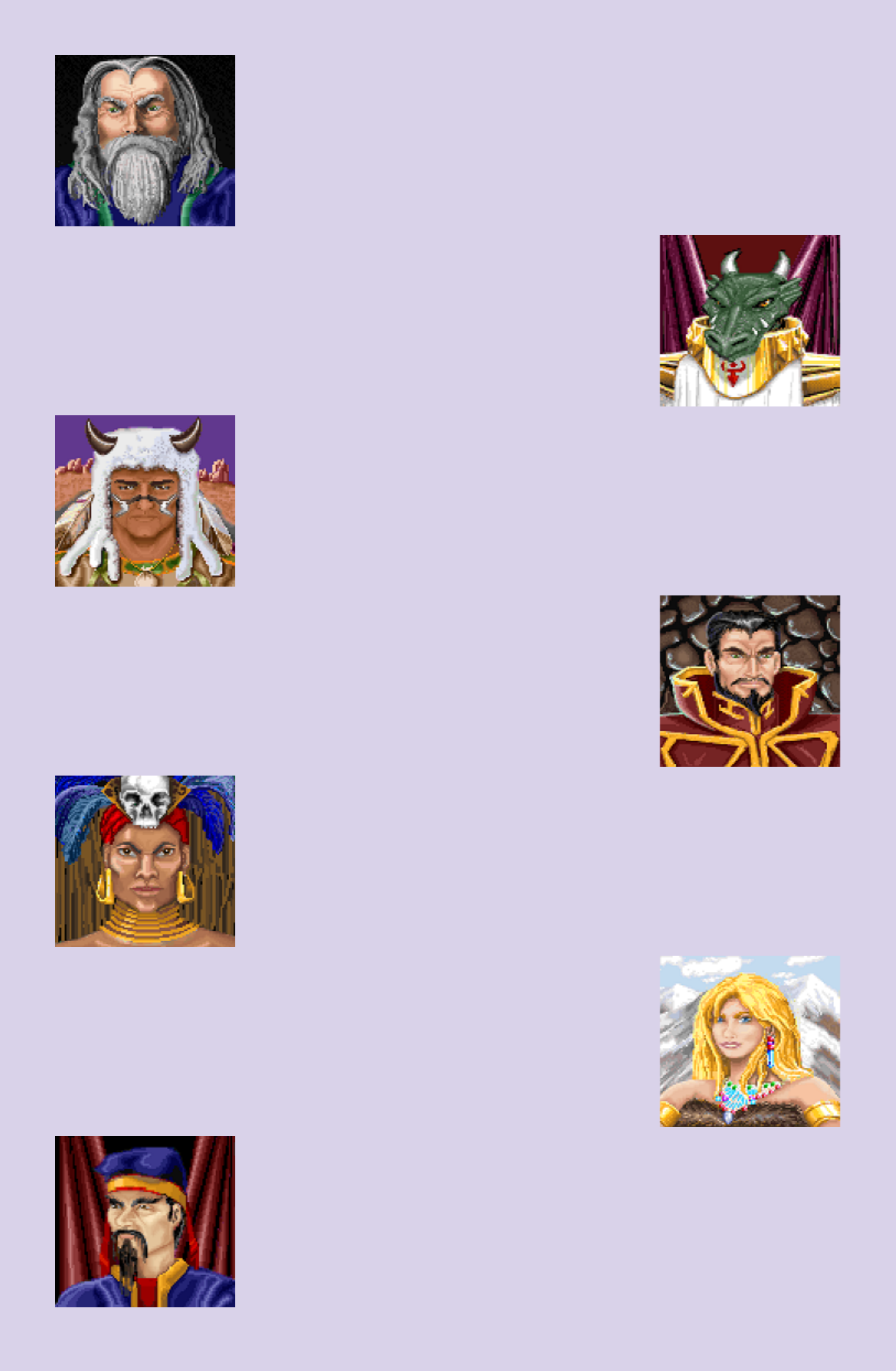
A Wizard of the High Men, Merlin serves as his own best scholar-counselor
in a deeply personal quest for the Spell of Mastery. From scratch, he
intends to weave this spell like a tapestry with the vast fabric of knowledge
in the natural and abstract worlds. Like a true grail quest, the process itself
may prove more gratifying and significant to him than its completion.
Type: Dual-Link Life & Nature
The Draconian known as Sss'ra aims to unite the feudal clans of Myrror
under a new multicultural ideology. His imperium will change the face of his
home Plane with coordinated trade, infrastructure, and armaments. With
the strength thus gained, he can turn upon Arcanus, crush its pitiful
empires, and end all dispute as to who is the Master of Magic.
Type: Dual-Link Life & Chaos
Raven is a wandering Shaman of earth and sky. His ministry's long-term
plans are as inscrutable and ominous as the creature for which he is
named. Far less mysterious, everyone knows, are the disciples of a great
medicine man, weapons held out before them, thunderclouds at their
backs, and the ground rumbling angrily at the impudence of their enemies.
Type: Dual-Link Sorcery & Nature
A demon of the Chaos Realm, Tauron rates himself both victim and victor
in the power play that ejected him onto the cosmic backwater of Arcanus.
Where his foes saw a fitting dead end, Tauron sees the future. Here hides
an opportunity to rampage across unspoiled land, drunk on domination and
pyro-magical thrills, ascending to the heights of power and abuse.
Type: Chaos
Sharee is a hard-featured priestess of Chaos and Death who indulges in
direct communion with the denizens of these Realms. Several dragons and
Demon Lords gauge this madwoman to be a promising cat's-paw for
lengthening their own shadows across Arcanus and Myrror, and lease their
minions to her through unusual bargains.
Type: Dual-Link Chaos & Death
Freya is a beautiful Elven nymph who channels Nature's power intuitively.
Crass rumors fly on the rituals behind her spells' uncanny strength. Freya
views industry, politics, and conquest as vital processes tying advanced
Races to the Nature Realm. She will rule them gleefully and battle it out
with fellow Wizards to see that the ancient forms are obeyed.
Type: Nature
This Wizard bears the mark of chi flow/suspension discipline seen in
renowned warriors like Shin Bo and Taki. Lo Pan's choice of name is
steeped in the lore of Feng-Shui geomancy, an obscure branch of planetary
magic that enables the Wizard to anchor himself while manifesting his chi at
extremely remote locations.
Type: Dual-Link Sorcery & Chaos
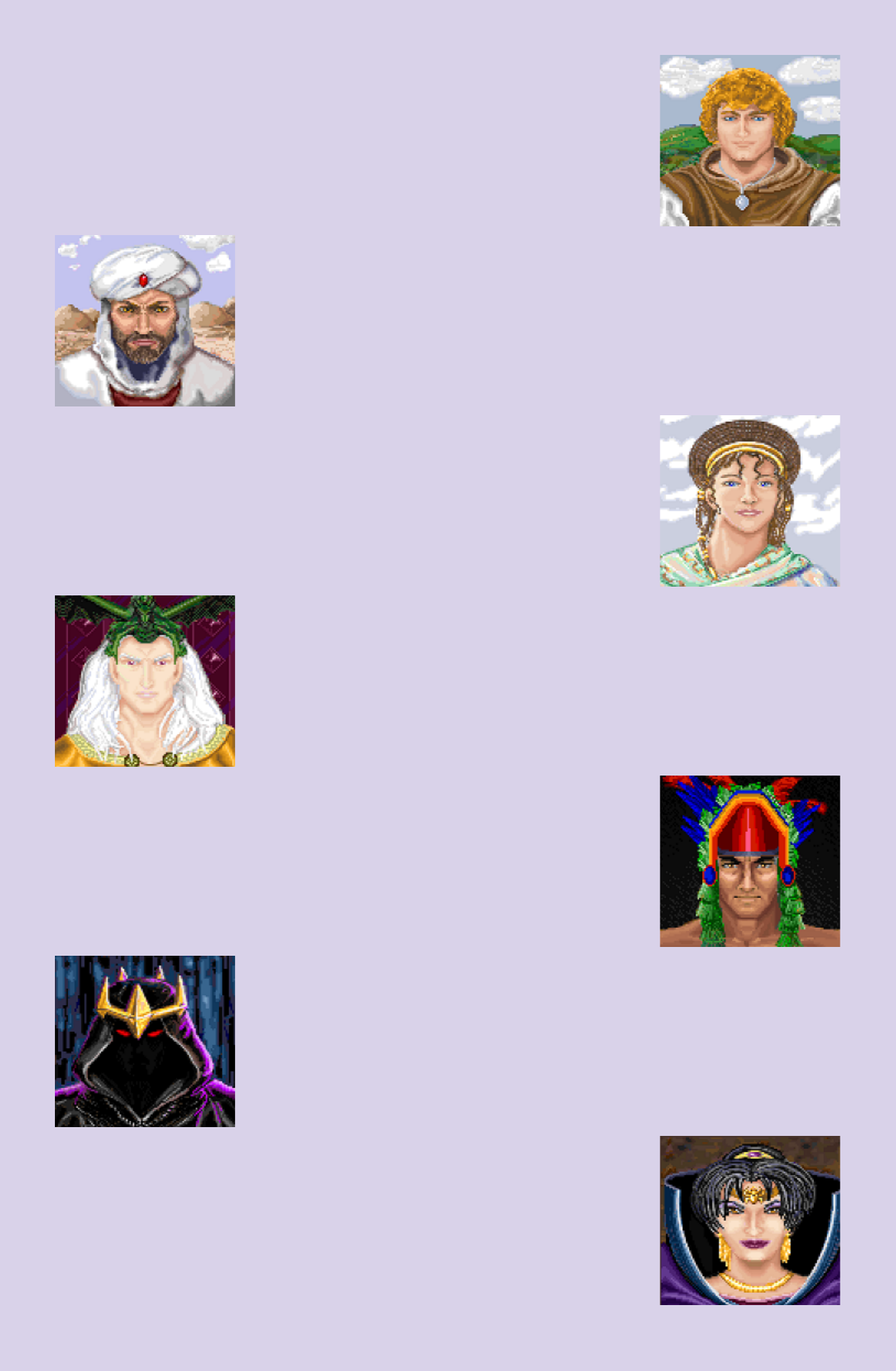
Horus is a young spellcasting prodigy, or Archmage, a fact made all the
more astounding by his stolid Halfling ancestry. Horus can work fast,
instinctively steering Power on optimal channels in spellcraft. While Horus
is only dimly-aware of this advantage, he is most eager to take to the field
and play mind games with rival Wizards.
Type: Dual-Link Life & Sorcery
Long, methodical study of Quork Crystal samples gleaned from the sands
earned Jafar the mantle of Alchemist, a final authority on perfect matter
and energy conversions. Perhaps yearning to lay eyes on fabled Crysx
Crystals, Jafar has erected a Fortress and entered politics. Breaking into
Myrror is more the task of a nation than a doddering scholar.
Type: Sorcery
Ariel is a priestess in the academic arm of the Holy See charged with
high-stakes leadership tasks on behalf of Life. Even races that cannot
appreciate human beauty are transfixed by her genuine, selfless love. Ariel
dreams of victory for her faith and the Life Realm. The new terms of
existence emerging from such a victory are a complete and total mystery.
Type: Life
Oberic is a powerful elementalist, wielding earth, water, and fire. Like his
elemental attunement, Oberic's power base has a three-sided countenance:
the protection and subtle tools of Nature; the brutal fist of Chaos; and his
own, innate ability to draw up great amounts of Mana. Oberic views
governance with deep irritation.
Type: Dual-Link Chaos & Nature
A warmongering musclehead with notions of godhood, Tlaloc plays up his
mystique as a wizard-priest by holding sacrificial rites. The mixed fear and
frenzy he instills in his troops produces real results on the battlefield. Tlaloc
aims to convert the entirety of Arcanus and Myrror into a brutal slave
empire, with him standing at its doctrinal center.
Type: Dual-Link Death & Nature
Rjak is the face of institutional abuse, murderous intent, and Saturday
morning cartoon villainy. Rjak builds armies of Undead vermin, fiends, and
demented mortal thralls. He spreads plague and attacks everyone
indiscriminately. Rjak is touched by the raw power of Hell; Towns he
captures reorganize themselves into syndicates of war and evil.
Type: Death
The witch Kali possesses theoretical knowledge of binding souls and
reagents into talismans of great power. Presently, Kali can only glimpse the
difficulty of this art, not overcome it. True Artifacts could be manifestations
of tension between the magical Realms themselves; certainly no mortal in
memory wields the immense power such creations would require.
Type: Dual-Link Death & Sorcery

Miscellaneous Notes (For those who care about the little details)
● Companions replacing a given hero using either of the first two “Companion” perk options still
require any gold upkeep that hero might have required. It is your choice whether the
companion keeps and uses the gold for themselves, or your benefactor sets it aside as an
end-of-jump bonus for them.
● In the game, you are limited to 6 heroes. The cap here is raised to 8, in case you have brought
that many hero-companions along.
● In the original game, heroes are limited to three magic item slots each. Generally, one weapon,
one defensive item, and one jewelry item. In jump, a hero can wear whatever they could
reasonably wear, but item enchantments don’t stack indefinitely. Put a helmet, shield, and
platemail on them if you want, but the “invulnerability” spell on all of them will just be
redundant, for example.
● Starting on Myrran, here, is somewhat underpriced compared to the in-game advantage it
gives you. This is counterbalanced by the fact that it does not give you any goodies to take
forward to future jumps.
● While the combination of Artificer and Runemaster in game DOES allow an exploit that will let
you sunder artifacts for more mana than it takes to create them, it is my recommendation, as
the author of this piece, that you not allow yourself to utilize this exploit. I will not explicitly
forbid it, though, because it is part of the base game. Even with the exploit, it still takes up your
casting time making artifacts rather than casting other spells.
● Magic in Master of Magic can affect both worlds, Arcanus and Myrran, which are close mirrors
of each other. This does not imply that it can affect “everywhere”, and certainly not, say, an
entire galaxy. Given that magic becomes more inefficient the farther you project it, casting to
other planets in the solar system might be possible, but would require obscene amounts of
power. The moon is a bit more plausible. On the other hand, if there is another version of the
world which is closely linked (e.g. a faerie realm), then the magic can reach there easily.
● As far as I’m concerned, you are welcome to use version 1.12 if you do not like the changes to
the Drop-In background.
1.13B: Free race choice reduced to 50 CP. Explicitly noted that personality effects of backgrounds are
controllable. Life/Death/Chaos/Nature/Sorcery backgrounds made free (formerly 100). Dual Focus increased to
200, but due to free books of both types, it’s still cheaper to master two types than in the previous version. New
Tri-Focus background (300). 5 Links changed to 10 books to be more in line with the game themes. Each
corresponding background gets two free books. The books are linked to you irrevocably.
Life/Death/Chaos/Nature/Sorcery perks costing 400/600 reduced to 300/400, due to comparing unfavorably
with an equivalent number of “books”. Charismatic & Famous, Master of Undeath, Warlord & Conjurer boosted
slightly. Small items section. Companion wizard possible. Added section on Spellbooks & Retorts & Dungeons.
Changed Gaming Classic drawback to limit you to the canonical 13 book limit. Added post jump reward of
being able to incorporate races in your empire into future empires in other jumps. Updated appendixes a bunch
based on changes.
1.13C: Removed fiat restriction on Spell of Mastery; added possible interpretations instead.
1.14: Overhaul of look/font/etc. I Am The Tower changed to a general perk due to its overwhelming popularity.
Re-arranged Drop-In a bit. Added A Smattering Of Books option to Drop-In.
1.15: Added additional 200CP ‘Summon’ type perk to Life/Death/Chaos/Sorcery/Nature. Very minor (positive)
tweaks to several perks in Life/Death/Chaos/Sorcery/Nature. Added information on the 14 Canon enemy
wizards to the appendix. Changed background color.
